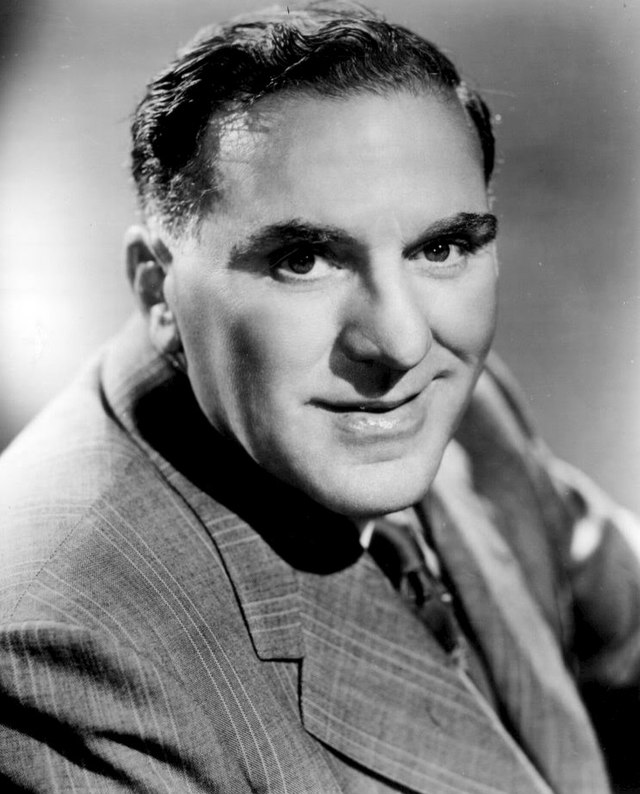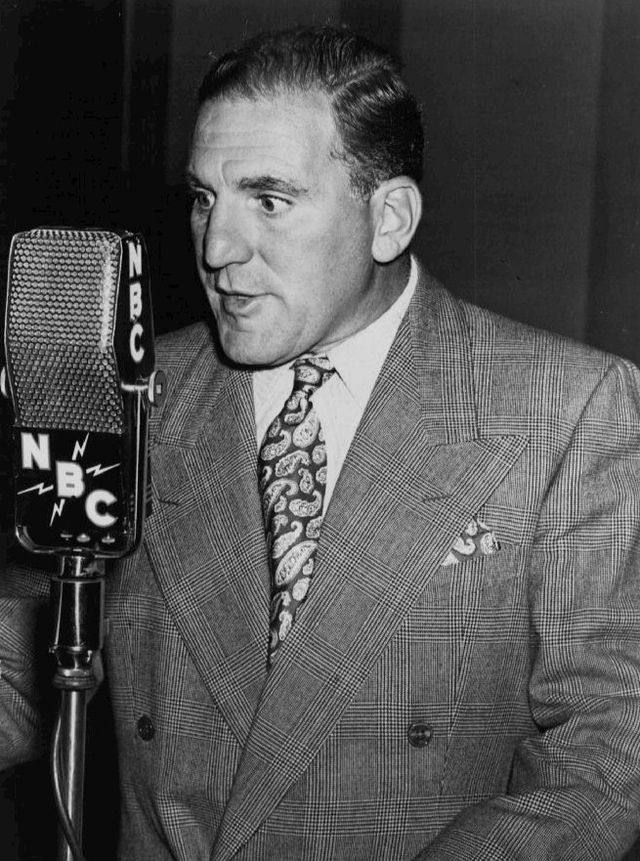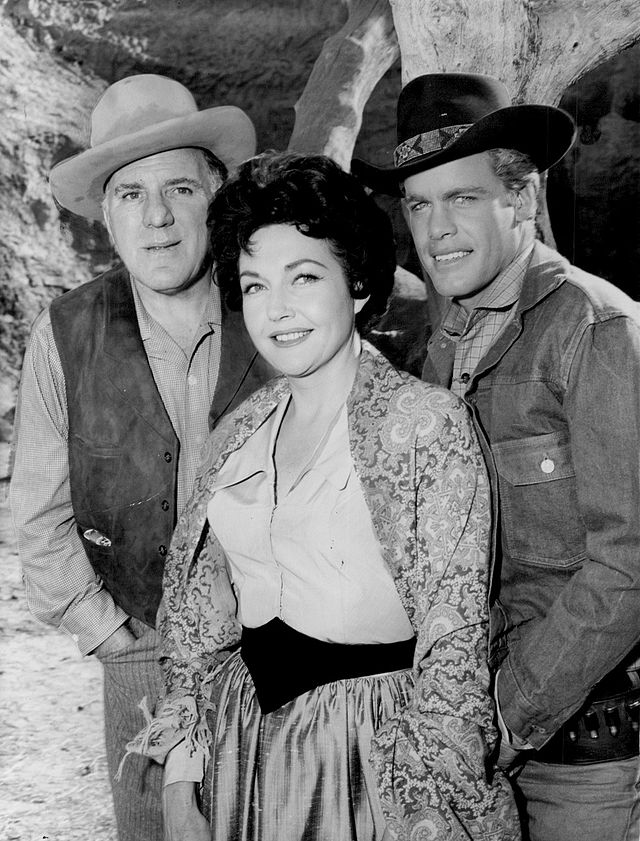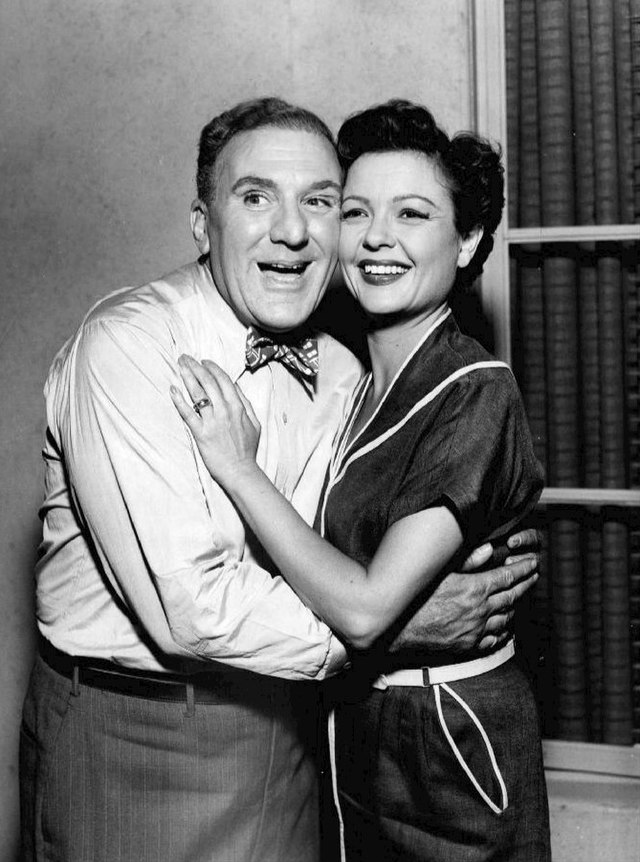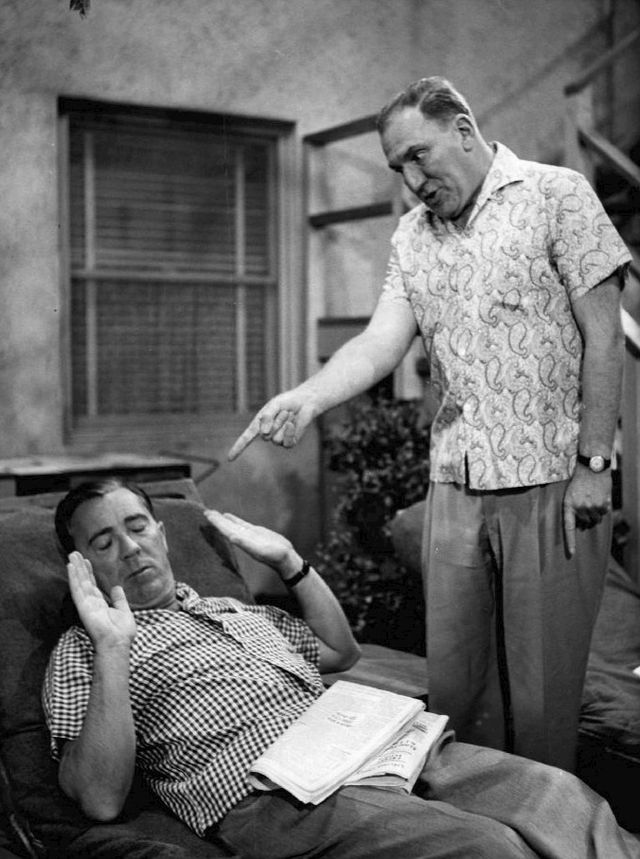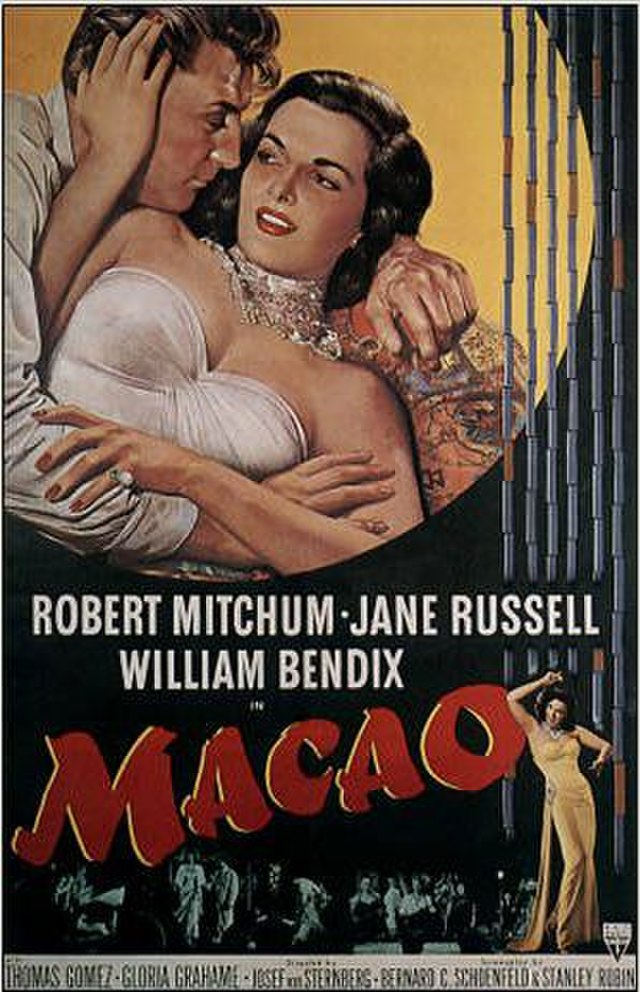William Bendix (1906 – 1964)
Biography and Movie Career
William Bendix was born on January 14, 1906, in Manhattan, New York City, to Oscar and Hilda Bendix. He grew up in a working-class family, deeply rooted in the vibrant culture of early 20th-century New York. Bendix's father was a musician, and his mother managed a household filled with love and practicality. As a young boy, Bendix exhibited a natural charisma and charm, though his early life showed no strong inclination toward acting.
Bendix attended Public School 5 in New York before graduating from Townsend Harris High School. Afterward, he worked a variety of odd jobs to support his family during financially challenging times. Among his jobs was delivering groceries and working at a grocery store, where he honed the relatable and affable qualities that later defined his screen persona.
A Unique Path Toward Success
Before embarking on an acting career, Bendix explored several professions. His connection to the Yankees, where he worked as a batboy, led to a lifelong love of baseball. He had a chance encounter with Babe Ruth during this time, which later inspired his memorable portrayal of the legendary baseball player in The Babe Ruth Story (1948).
Bendix's journey into acting was unconventional. His natural storytelling ability and down-to-earth personality caught the attention of local theater groups. He made his way into Broadway productions in the 1930s, gaining experience in small roles that highlighted his rugged everyman appeal.
Hollywood took notice of Bendix during this period, leading to his first film roles in the late 1930s. He began with uncredited parts but soon became recognized for his ability to bring sincerity and depth to blue-collar characters. His breakout role came in Wake Island (1942), where he played a Marine sergeant with heartfelt conviction. The performance earned him an Academy Award nomination for Best Supporting Actor, cementing his status as a rising star.
Career Highlights and Stardom
Bendix's career flourished in the 1940s and 1950s, with standout performances in movies such as Alfred Hitchcock's Lifeboat (1944), The Blue Dahlia (1946), and The Hairy Ape (1944). His roles often depicted the struggles and humanity of the working class, resonating with audiences who appreciated his relatability and charm.
Beyond film, Bendix found immense success on radio and television. He starred as Chester A. Riley in The Life of Riley, a sitcom about the trials and tribulations of a blue-collar family man. The show debuted on radio in 1944 and was adapted for television in 1949. Bendix's portrayal of Riley, with his humorous catchphrase, "What a revoltin' development this is!" endeared him to millions of fans.
Personal Life and Passions
In 1927, William Bendix married Theresa Stefanotti, and the couple shared a long and devoted partnership until his death. They had two daughters, Stephanie and Lorraine, and their family life was a cornerstone of Bendix's world.
Bendix had a deep passion for baseball, often attending games and maintaining a connection to the sport he cherished from his youth. He also enjoyed storytelling and entertaining friends and family with humorous anecdotes, a testament to his natural charisma.
Despite his success, Bendix remained grounded and approachable, never allowing fame to alter his humble demeanor.
Later Years and Death
William Bendix continued to work steadily into the early 1960s, appearing in films and television projects that showcased his enduring talent. However, his health began to decline in the early 1960s due to lifestyle factors, including years of heavy smoking.
On December 14, 1964, Bendix passed away at the age of 58 from complications related to pneumonia. His death was a great loss to Hollywood and the millions who admired his work. He was laid to rest at San Fernando Mission Cemetery in Mission Hills, California.
Legacy
William Bendix's career spanned over two decades, leaving an indelible mark on the film and television industry. His portrayals of working-class characters resonated with audiences and highlighted the dignity and struggles of everyday life. Whether as a comedic family man or a dramatic Marine sergeant, Bendix brought authenticity and heart to every role he played.
His contributions to entertainment are fondly remembered, and his legacy endures as a beloved symbol of mid-20th-century American cinema.
A Short Video on William Bendix
William Bendix Measurements
William Bendix was known for his robust build and imposing physical presence, which made him ideal for roles portraying working-class men and rugged characters. While exact measurements are not extensively documented, here’s an estimation based on available descriptions and his film appearances:
• Height: Approximately 5 feet 10 inches (178 cm)
• Weight: Around 190-210 pounds (86-95 kg) during his prime years
• Build: Stocky and solid, with a broad chest and shoulders that emphasized his working-class persona
• Hair Color: Brown (graying later in life)
• Eye Color: Blue
William Bendix’ Acting Style
William Bendix was a quintessential "everyman" actor, known for his ability to imbue his characters with authenticity, warmth, and relatability. His acting style was rooted in his naturalistic approach, which often reflected his working-class background and unpretentious demeanor.
Relatable Everyman Persona
Bendix's performances resonated with audiences because he played characters who felt familiar and approachable. Whether portraying a blue-collar worker, a Marine, or a family man, Bendix had an uncanny ability to connect with viewers by embodying the struggles, humor, and resilience of the average person. He was particularly skilled at using his physicality—his stocky build, expressive face, and earthy voice—to portray men who were tough on the outside but tender and vulnerable underneath.
Effortless Humor and Charm
Comedy came naturally to Bendix, and his timing was impeccable. In his most famous role as Chester A. Riley in The Life of Riley, he delivered humor in a way that felt organic and unforced. His catchphrase, "What a revoltin' development this is!" became iconic because it encapsulated his character's lovable mix of exasperation and optimism. Bendix excelled at self-deprecating humor, often playing the bumbling but well-meaning man who stumbles through life’s challenges with good intentions.
Emotional Depth in Drama
While his comedic talents made him a household name, Bendix was equally adept at drama. In films like Lifeboat and Wake Island, he portrayed characters facing intense physical and emotional trials. Bendix had a remarkable ability to convey vulnerability and inner turmoil, often through subtle facial expressions or a poignant delivery of dialogue. His roles often required him to balance toughness with sensitivity, and he did so with finesse.
Physicality and Grit
Bendix's rugged physical appearance lent itself to roles that required a sense of grit and determination. He frequently played soldiers, sailors, and working-class men, bringing a believable toughness to his performances. His physicality wasn’t just about his build; he used his body language to convey everything from aggression to tenderness, enhancing the realism of his characters.
Versatility Across Genres
While he often played variations of the same archetype, Bendix showed versatility across different genres. In film noir like The Blue Dahlia, he brought an edge of danger and complexity. In war dramas such as Guadalcanal Diary, he portrayed courage and camaraderie with conviction. His comedic roles, on the other hand, allowed him to showcase a lighter, more playful side. This adaptability made him a valuable character actor capable of elevating a wide range of stories.
Grounded and Naturalistic
Bendix's acting style was free of pretense or exaggeration. He avoided grand gestures or overly theatrical performances, choosing instead to act in a way that felt grounded and believable. This naturalism was a key part of his appeal, as it allowed audiences to see themselves in his characters.
Signature Voice
His distinctive voice—gruff yet warm—was another defining feature of his acting style. Whether delivering a heartfelt line or a comedic quip, Bendix's voice carried an authenticity that made his performances memorable.
Quotes from William Bendix
From "The Life of Riley" (Radio and TV Series)
• "What a revoltin' development this is!"
This iconic catchphrase became synonymous with his character, Chester A. Riley, and encapsulated the comedic exasperation and resilience of the working-class everyman he portrayed.
• "I got a scheme that's foolproof... except for one thing: it ain't foolproof."
A classic example of Riley's well-meaning but often misguided attempts to solve problems in his life.
• "Why didn’t somebody tell me my brains would be such a handicap?"
A humorous self-deprecating line that highlights Riley’s lovable, bumbling nature.
________________________________________
From His Films
• "We're all in the same boat now, and it’s not a very big one." (Lifeboat, 1944)
Spoken as Gus Smith, this line reflects the dire situation and shared humanity of the characters stranded together in Hitchcock's wartime drama.
• "The thing about baseball is, you never know what’s gonna happen until it happens." (The Babe Ruth Story, 1948)
As Babe Ruth, Bendix delivers this line with the enthusiasm and wonder of a man who truly loves the game.
________________________________________
Personal Quotes
• "Save a buck or two and keep on acting—pretty soon, you’ll have a good actor and a rich one."
Bendix’s practical advice to aspiring actors reflected his humble beginnings and grounded perspective on fame.
• "I’ve had my ups and downs, but I wouldn’t trade my life for anybody’s. I made people laugh, and that’s enough for me."
A heartfelt expression of gratitude for his career and legacy in entertainment.
• "You don’t have to be fancy to be good; you just have to be honest."
Bendix’s straightforward philosophy on acting, which was evident in his naturalistic and relatable performances.
Awards and Recognition
William Bendix's career spanned over two decades, during which he earned recognition for his performances in film, radio, and television. While he was not a prolific award-winner compared to some of his contemporaries, his work resonated deeply with audiences, and he received accolades that highlighted his talent. Here is a complete overview of the awards and recognition he received:
________________________________________
Academy Awards
• 1942: Nominated for Best Supporting Actor for Wake Island
o Bendix earned critical acclaim for his portrayal of Private Aloysius K. "Smacksie" Randall in this World War II drama. His performance was praised for its emotional depth and humanity, standing out in a strong ensemble cast.
________________________________________
Radio and Television Recognition
• Radio: As the star of The Life of Riley (1944–1951), Bendix became one of the most beloved comedic performers on radio. Though formal awards for radio performances were rare at the time, the show's popularity cemented his reputation as a skilled comedic actor.
• Television: The Life of Riley transitioned to television in 1949, earning significant praise. While Bendix did not personally win awards for his role on television, the series was celebrated as a pioneer in situational comedy, and his portrayal of Chester A. Riley became iconic.
________________________________________
Walk of Fame
• Hollywood Walk of Fame: In recognition of his contributions to the entertainment industry, William Bendix was honored with a star on the Hollywood Walk of Fame.
o Category: Motion Pictures
o Location: 1638 Vine Street
o This acknowledgment symbolizes his enduring impact on Hollywood and popular culture.
________________________________________
Critical Acclaim and Audience Recognition
• Bendix received widespread acclaim for his ability to balance comedic and dramatic roles, earning him a loyal fan base. While not formal awards, this popular and critical recognition played a significant role in his lasting legacy.
• His performance in The Blue Dahlia (1946) as Buzz Wanchek, a shell-shocked war veteran, was particularly well-regarded and solidified his status as a talented character actor.
________________________________________
Legacy in Retrospective Honors
• Bendix has been celebrated in retrospective showcases of classic Hollywood films, particularly for his roles in Wake Island, The Blue Dahlia, and Lifeboat. Film historians often highlight his Academy Award nomination as a significant achievement for a character actor of his era.
• He is frequently remembered as one of the quintessential "everyman" actors in American cinema, often celebrated in discussions of Golden Age Hollywood's most relatable stars.
William Bendix Movies
1940s
1942
• Brooklyn Orchid: A romantic comedy about two cab drivers who unexpectedly inherit a fortune.
• The Glass Key: A political drama about corruption and murder, where Bendix played a memorable tough guy named Jeff.
• Wake Island: A war drama that tells the heroic story of Marines defending Wake Island during World War II, earning Bendix an Academy Award nomination for Best Supporting Actor.
1943
• China: A wartime drama in which an American oilman teams up with Chinese guerrillas during Japan's invasion.
• Guadalcanal Diary: A gripping depiction of the lives of soldiers during the campaign at Guadalcanal.
1944
• Lifeboat: An Alfred Hitchcock drama set on a lifeboat with survivors of a torpedoed ship, showcasing human conflicts and survival instincts.
• The Hairy Ape: A social commentary film where Bendix plays a brutish but lonely ship stoker grappling with class divisions.
1945
• A Bell for Adano: A World War II drama about an American officer trying to bring peace to a war-torn Italian village.
1946
• The Blue Dahlia: A film noir about a returning soldier investigating his wife's murder, with Bendix playing his loyal, shell-shocked war buddy.
1947
• Where There's Life: A comedy involving mistaken identity, with Bendix playing a hapless cab driver.
1948
• The Babe Ruth Story: A biographical drama where Bendix portrayed the legendary baseball player Babe Ruth.
• Race Street: A film noir about a bookie trying to escape a crime syndicate.
1949
• The Life of Riley: A comedy film adaptation of the popular radio show, featuring Bendix as the lovable Chester A. Riley.
________________________________________
1950s
1950
• Kill the Umpire: A comedy where Bendix plays a baseball fan forced to become an umpire, leading to humorous conflicts.
1951
• The Big Steal: A crime thriller involving a payroll robbery investigation.
1953
• A Girl in Every Port: A romantic comedy about sailors competing for the affections of a beautiful woman.
1954
• Crashout: A tense prison-break thriller with Bendix as one of the escapees.
1956
• The Proud and Profane: A romantic drama set during World War II, focusing on love and loss.
1957
• Battle Stations: A naval war drama about the lives of sailors during World War II.
________________________________________
1960s
1961
• The Detectives: A crime drama showcasing Bendix in a gritty law enforcement role.
1962
• The Young and the Brave: A Korean War drama about the courage of a young boy and his military protectors.
1964
• Johnny Cool: A crime thriller involving a mobster's vendetta.

